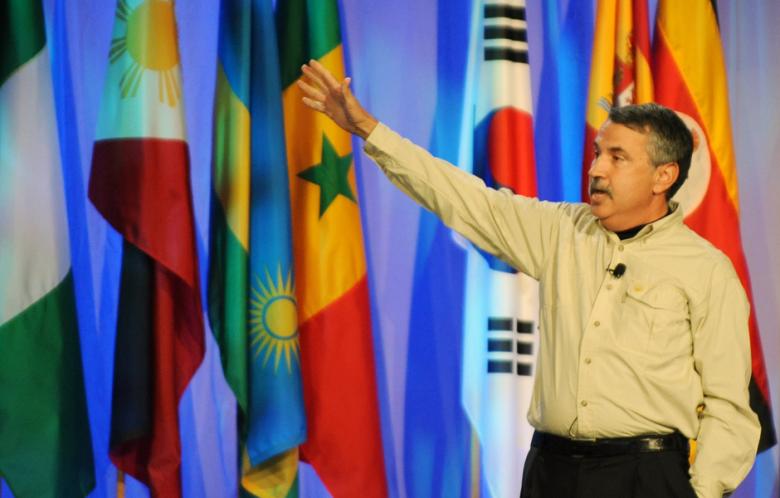U.S. journalist Thomas Loren Friedman arrived in Vietnam on Tuesday to begin a six-day visit, his second call after nearly two decades, to the Southeast Asian country.
Friedman is an internationally renowned author, reporter, and columnist – the recipient of three Pulitzer Prizes and the author of six best-selling books, including “The World Is Flat.”
Most of his articles appear in The New York Times newspaper where he works as a foreign affairs columnist. He writes a twice-weekly column for The New York Times and has written extensively on foreign affairs including global trade, the Middle East, globalization, and environmental issues.
On his second visit to Vietnam, Friedman will join talks and seminars with local policymakers, academics and entrepreneurs to exchange ideas on issues important to the development of the country.
These issues include the development of green technologies, energy, and biotechnology, the new set of world political and economic forces through 2030 and their impact on the national and regional issues, success and failure lessons of many countries worldwide in the past 20 years, and the opportunity and challenge for Vietnam in the new era.
Friedman will also have talks with some of the leading enterprises in Vietnam to provide important clues about the development and direction for the future.
In addition, Friedman will have two talks with students of the Vietnam National University – Hanoi and the Vietnam National University – Ho Chi Minh City to help the students - the young generation of the country - have access to new knowledge and deep identity from one of the world's leading commentators. From 2:00 to 4:00 pm on Thursday, Tuoi Tre (Youth) newspaper will organize an online exchange between Thomas Friedman and its readers at: http://tuoitre.vn with the theme "Challenges and Opportunities for Vietnam in the New Era".
This is a valuable opportunity for local readers to better understand the trends in the world which are affecting Vietnam and how the country needs to take advantage of opportunities to promote and enhance its position in the world.
Groundbreaking works
Today, the phrase "The world is flat" is very familiar and has become a default setting in many public debates, books and academic works.
However, in 2005, when the world entered the stage of globalization, the integration of many civilizations in the globalization process was at a very beginning phase, the flattening trend of the world was not then an easy thing to be observed.
But “The World Is Flat” is not the first way in which Friedman introduced new concepts and ideas to the public.
In 1999, when the world was still in debate as to whether or not a globalization process was underway, Thomas Friedman published “The Lexus and the Olive Tree,” confirming a fact that globalization was not only a trend but also a process taking place objectively, directly or indirectly impacting on politics, environment, geopolitics and economics of virtually every country in the world.
At the same time the book also pointed out that global competition is ultimately a conflict between the “new things" and the "old stuff," which is metaphorically depicted in the iconic "Lexus"- a luxury and modern car brand of Toyota - and the old "olive tree" sitting on the bank of the Jordan river.
Not only being encapsulated in the topic of globalization, Friedman also wrote books on many other global issues. In 2002, he published the book “Longitude and Attitudes: Exploring the World After September 11,” honestly describing the feelings of the American people after the 11/9 attack and helped them recognize themselves in a complex new world.
In 2009, in his book “Hot, Flat, and Crowded,” Friedman presented the severity of the problem of climate change and energy issues as well as the need for a green revolution.
In the latest one, “That Used to Be U.S.” co-penned with Michael Mandelbaum, published in 2011, the two authors analyzed the four challenges the American people are facing, including globalization, the revolution in information technology, the balance of payment deficit, and alarming energy consumption.
The book also indicates paralysis in the political system and the erosion of American values are the main reason why the United States cannot implement the necessary measures to address these challenges.





















































